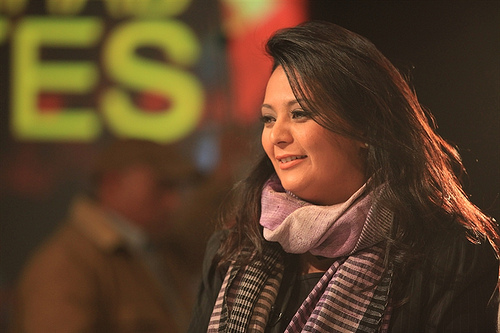There is only one conversation in Cairo this week — Who will you vote for in the run-off election? The revolutionaries themselves can’t agree on whether Islamic domination or a return to a Mubarak-esque autocracy would be worse for the country. The spectacle of the elections has overshadowed the fact that no matter how transparent and free the voting is, or who wins the election, this is simply another step towards greater instability and reconstitution of the Mubarak police state — and for the immediate future this spells chaos.
The legality of Shafiq’s candidacy is still in question. When the Muslim Brotherhood-controlled Parliament passed a law banning anyone who had served as a prime minister under Mubarak within the past ten years and senior officials of the National Democratic Party from running for president, Shafiq objected to the ban. The Supreme Election Commission, after first implementing the ban on Shafiq, has referred the appeal to the Supreme Constitutional Court (SCC) and reinstated him as a candidate, noting that the commission had accepted Shafiq’s appeal in case the SCC should decide against the legality of the ban on the Mubarak-era officials. But last week, a report by the SCC commissioner noted that the elections commission, an administrative body mandated to oversee the elections process, has exceeded its authority by referring the law — an act legally reserved exclusively for courts — to the SCC to examine its legality. What does this mean? The SCC will most likely not hear the appeal on procedural grounds, in essence upholding the ban on Shafiq even after the elections take place. Having already received 5 million votes that could have tipped the scale in a third candidate’s direction, throws the entire election process into a political black hole.
At this stage, the nullification of Shafiq’s candidacy wouldn’t fix the procedural issues with the election, nor would it automatically mean a Morsi win. The Muslim Brotherhood is facing a decline in its popularity among the electorate. After an Islamist landslide in the first parliamentary elections, they had a very modest showing in the presidential elections. The Muslim Brotherhood had benefited from the change vote during the parliamentary elections, being the most organized opposition group. However, in the last four months, the Muslim Brotherhood has proven that it is not radically different from Mubarak and his former ruling party. During the parliamentary elections, voters supported the Muslim Brotherhood because this was the only existing political party that had constituted a well-known opposition to Mubarak and his party in the past. The votes demonstrate the declining support of Islamist candidates by dropping from approximately 70 percent to 37 percent in the past few months alone.
The question of the Constitution is another factor that adds to the confusion. Egypt today doesn’t have a constitution or even a Constitutional Assembly. While political parties and parlimentarians agreed to new guidelines for forming the Constitutional Committee, there is still a lot of maneuvering and negotiating between various stakeholders and the Freedom and Justice Party. The first attempt at establishing a committee was a unilateral effort by Islamists, that marginalized all other stakeholders especially minorities. It included token women, liberals, and Christians but not the consultation of stakeholders. In fact the representative of the Anglican Church for the first Constitutional Assembly was a vice chair in the Freedom and Justice Party, the Muslim Brotherhood party. Add to that the SCAF’s threat of reviving the 1971 constitutions if political forces couldn’t agree and you have a prizefight with three boxers.
The elephant in the room is actually that the writing of the constitution will include a delineation of the powers of Egypt’s future presidents, and many believe that such powers will be defined by the Islamists in the Constitutional Assembly based on the outcome of the upcoming presidential elections. Thus, Islamists will be making fundamental decisions regarding checks and balances related to the president’s power in Egypt according to which candidate is elected for the coming term. Such shortsightedness is unacceptable given the gravity of the matter of founding Egypt’s system of government, which should be appropriate for Egyptian society for many years to come rather than beneficial only for current political interests. If Shafiq wins we can expect no constitutional checks on parliament, and most likely no power of veto. This means the paralysis of the entire government.
The SCC is still reviewing the constitutionality of the parliamentary elections. The recent SCC Commisioner’s report has shown the courts leaning to dissolving the parliament. This means that the parliament could still be dissolved, leaving the president as the only authority with a public mandate, consolidating power in the hand of one man yet again. This is just a background on the fight for democracy in Egypt.
Freedom on the decline
A major issue for most protestors and indeed for Egyptian society as a whole is the need to reform the state security apparatus, something which neither candidate shows any signs of intending to do. Shafiq’s biggest campaign promise has been to bring back stability. In the name of stability, he would only breathe new life into the old security apparatus, creating an illusion of safety while continuing to implement the oppressive policies of the Mubarak regime.
The situation under the Muslim Brotherhood doesn’t look much better. The Brotherhood has a history of tight control over their members and very authoritarian tendencies to dealing with dissent. Within months of the January 25th Revolution, many of its younger members, who were closely tied to the Revolutionary Youth Coalition and some of the first members of the Brotherhood to engage in the protests, were kicked out of the organization for taking stances that didn’t fully comply with the leaders’ vision. If given authority over the security apparatus, they will not be inclined to reform the police state and limit its powers. Instead, it is likely that they would reconstruct the security apparatus to serve the new government’s interests.
Alongside a strong police state, we can expect continued deterioration of human rights in Egypt, whether under Morsi or Shafiq. Under a Morsi presidency we might expect increased violations of freedom of expression and freedom of religion and belief. Islamic movements were at the heart of the defamation campaign against human rights NGOs in Egypt. Some of the complaints and law suits that were filed against NGOs originated from well-known political Islamic figures.
Respect for women’s rights will likely deteriorate under Islamist control as well. Thus far, the Parliament has been a bastion of anti-women legislation. There have been several attempts to roll back some of the gains made in recent years, including revoking of the ban on female genital mutilation, lowering the legal marriage age from 18 to 14, and repealing the “Khulaa Law,” a law allowing women to initiate no-fault divorce.
Under Shafiq, Egypt can also expect an increase in human rights violations. His campaign promises include using a firm hand against the protesters and checking the rise of political Islam, which are in effect calls for the expulsion of Islamic political movements and the youth revolutionaries from the political arena. Unlike Mursi, Shafiq has been proud of his ability to contravene national and international norms. We can anticipate a rise in protests if he wins, as we saw the day after it was announced that he advanced into the second round. His campaign promises leave no doubt that there will be a marked increase in violations against peaceful protest and tightened control on freedom of expression.
A returning to the past not transitioning to democracy
With an increase in confusion over the electoral process, public confidence in the transition will diminish. The electorate seems spilt between the three camps, the revolutionary vote, Shafiq and Morsi, with the combined vote for the revolution being greater then the votes for either front runner. Voter turn out was also much less than expected — some commentators had predicted turn out at 90 percent. The boycott campaign has also been gaining ground, flooding social media with pictures of invalidated expatriate ballots that make clear statements for the revolution and against SCAF or both candidates. This is a sign that many no longer see the election as step in the transitional process.
The context in which this election is taking place is also extremely troubling. The state of the media in Egypt is less free than a year ago, plummeting 39 places to 166th of 179 on Reporters without Borders annual Press Freedom Index. Protesters continue to be detained and face military trials. There has been an escalation of violence by the military against peaceful protesters. There have been five major clashes between protesters and the military. Clashes tend to take place ahead of every election. The latest attack on peaceful protesters occurred in Abbasiya last month in which over three hundred people were arrested and tried in front of a military court. As of last September, 12,000 Egyptians had been tried in military courts.
Shafiq has promised no oversight of the military budget and will likely do nothing to prevent immunity from prosecution for the military. It has been estimated that the Egyptian military controls 40 percent of the Egyptian economy. With unchecked control over such a large portion of the economy, the military is able to undermine any policy that threatens their special status. The Freedom and Justice Party has not been willing to hold SCAF accountable either and have sided with the military against the revolutionaries during the recent violent clashes. In fact, at one point they offered the military a safe exit. Without transparency and accountability, there won’t be a genuine hand over of authority from the military to either candidate.
Everyone wants to believe that Egyptians are participating in a democratic transition, but this is a game with no rules and shifting goal posts. The goal of the revolution is and always has been freedom. Egypt is neither free nor democratic, and neither of the current presidential candidates has the potential to move in that direction. Thus, the election is just a procedural formality. Full stop. Once that is discovered, only chaos can ensue.
Nadine Wahba, Adocacy officer at Cairo Institute for Human Rights Studies (CIHRS)
Published in The Huffington post
Share this Post


